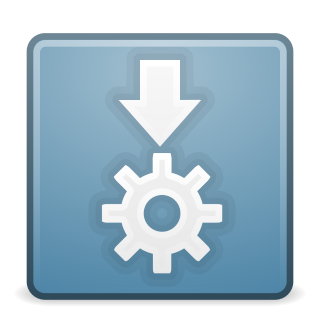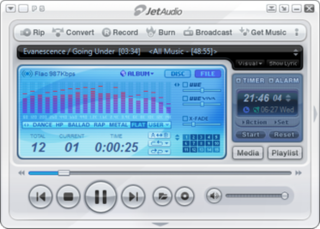A codec is a device or computer program that encodes or decodes a data stream or signal. Codec is a portmanteau of coder/decoder.
Shareware is a type of proprietary software that is initially shared by the owner for trial use at little or no cost. Often the software has limited functionality or incomplete documentation until the user sends payment to the software developer. Shareware is often offered as a download from a website. Shareware differs from freeware, which is fully-featured software distributed at no cost to the user but without source code being made available; and free and open-source software, in which the source code is freely available for anyone to inspect and alter.

Vorbis is a free and open-source software project headed by the Xiph.Org Foundation. The project produces an audio coding format and software reference encoder/decoder (codec) for lossy audio compression. Vorbis is most commonly used in conjunction with the Ogg container format and it is therefore often referred to as Ogg Vorbis.
Helix DNA was a project to produce computer software that can play audio and video media in various formats and aid in creating such media. It is intended as a largely free and open-source digital media framework that runs on numerous operating systems and processors and it was started by RealNetworks, which contributed much of the code. The Helix Community was an open collaborative effort to develop and extend the Helix DNA platform. The Helix Project has been discontinued.

VLC media player is a free and open-source, portable, cross-platform media player software and streaming media server developed by the VideoLAN project. VLC is available for desktop operating systems and mobile platforms, such as Android, iOS and iPadOS. VLC is also available on digital distribution platforms such as Apple's App Store, Google Play, and Microsoft Store.

FileZilla is a free and open-source, cross-platform FTP application, consisting of FileZilla Client and FileZilla Server. Clients are available for Windows, Linux, and macOS. Both server and client support FTP and FTPS, while the client can in addition connect to SFTP servers. FileZilla's source code is hosted on SourceForge.

ffdshow is an open-source unmaintained codec library that is mainly used for decoding of video in the MPEG-4 ASP and H.264/MPEG-4 AVC video formats, but it supports numerous other video and audio formats as well. It is free software released under GNU General Public License 2.0, runs on Windows, and is implemented as a Video for Windows (VFW) codec and a DirectShow filter.
The Common Development and Distribution License (CDDL) is a free and open-source software license, produced by Sun Microsystems, based on the Mozilla Public License (MPL). Files licensed under the CDDL can be combined with files licensed under other licenses, whether open source or proprietary. In 2005 the Open Source Initiative approved the license. The Free Software Foundation (FSF) considers it a free software license, but one which is incompatible with the GNU General Public License (GPL).

LiVES (LiVES Editing System) is a free and open-source video editing software and VJ tool, released under the GNU General Public License version 3 or later. There are binary versions available for most popular Linux distributions (including Debian, Ubuntu, Fedora, Suse, Gentoo, Slackware, Arch Linux, Mandriva and Mageia). There are also ports for BSD, and it will run under Solaris and IRIX. It has been compiled under OS X Leopard, but not thoroughly tested on that platform. In early 2019, a version for Microsoft Windows was announced, with a release slated for in the second half of 2019.

AppImage is a format for distributing portable software on Linux without needing superuser permissions to install the application. It aims to enable application developers to deploy binary software without being restricted to specific Linux distributions, a concept often referred to as upstream packaging. In this manner, a single developed software can effortlessly run on any Linux distribution, such as Ubuntu, RHEL, or Arch.

FrostWire is a free and open-source BitTorrent client first released in September 2004, as a fork of LimeWire. It was initially very similar to LimeWire in appearance and functionality, but over time developers added more features, including support for the BitTorrent protocol. In version 5, support for the Gnutella network was dropped entirely, and FrostWire became a BitTorrent-only client.

Transmission is a BitTorrent client which features a variety of user interfaces on top of a cross-platform back-end. Transmission is free software licensed under the terms of the GNU General Public License, with parts under the MIT License.
Free Download Manager is a download manager for Windows, macOS, Linux and Android.
The following tables compare general and technical information for a number of current, notable video hosting services. Please see the individual products' articles for further information.
Cortado is a streaming Java applet for Ogg formats Vorbis, Theora and Kate, μ-law, MJPEG and Smoke, released under the GPL. With Cortado a webpage can be set up to download the applet on the fly in the background, providing embedded support for Ogg-based media in Java-enabled web browsers without the need to install further software. Among others it has been used on Wikimedia projects and blip.tv.

CamStudio is an open-source screencasting program for Microsoft Windows released as free software. The software renders videos in an AVI format. It can also convert these AVIs into Flash Video format, embedded in SWF files. CamStudio is written in C++, but CamStudio 3 will be developed in C#. The program has distributed malware and harmful viruses via the installer.

JetAudio is a shareware media player application for Microsoft Windows and Android released in 1997, that offers playback options for a wide range of multimedia file formats.

Simplified Universal Player Encoder & Recorder (SUPER) is a closed-source front end for open-source software video players and encoders provided by the FFmpeg, MEncoder, MPlayer, x264, ffmpeg2theora, musepack, Monkey's Audio, True Audio, WavPack, libavcodec, and the Theora/Vorbis RealProducer plugIn projects. It was first released in 2005. SUPER provides a graphical user interface to these back-end programs, which use a command-line interface.
The HTML5 specification introduced the video element for the purpose of playing videos, partially replacing the object element. HTML5 video is intended by its creators to become the new standard way to show video on the web, instead of the previous de facto standard of using the proprietary Adobe Flash plugin, though early adoption was hampered by lack of agreement as to which video coding formats and audio coding formats should be supported in web browsers. As of 2020, HTML5 video is the only widely supported video playback technology in modern browsers, with the Flash plugin being phased out.

Free Studio is a freeware set of multimedia programs developed by DVDVideoSoft. The programs are available in one integrated package and also as separate downloads.










